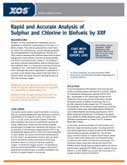- Analyzers
- Optics & Sources
- Technologies
- Support
- About
Rapid and Accurate Analysis of Sulphur and Chlorine in Biofuels by X-ray Fluorescence

XRF delivers rapid and accurate results for testing sulphur and chlorine in biofuels, backed by international standard test methods. Advantages of XRF technology include its nondestructive nature, easy sample preparation process, and quick results, in addition to accuracy that is on par with alternative technologies like UVF (ultraviolet fluorescence). Some relevant specifications and methods include EN 14214 (Fatty Acid Methyl Esters (FAME) for use in diesel engines and heating applications), ASTM D6751 (Standard Specification for Biodiesel Fuel Blend Stock (B100) for Middle Distillate Fuels), and ASTM D7467 (Standard Specification for Diesel Fuel Oil, Biodiesel Blend (B6 to B20)).
For this experiment the following samples were collected and analyzed for sulphur and chlorine:
- B10 (ULSD with 10% FAME)
- B20 (ULSD with 20% FAME)
- Gasoil
- Hydrotreated Vegetable Oil (HVO)
- Rapeseed Methyl Ester (RME)
- Soybean Methyl Ester (SME)
- Tallow Methyl Ester (TME)
- Used Cooking Oil Methyl Ester (UCOME)
Download our whitepaper to learn about a viable solution to measure both elements concurrently with one instrument.

